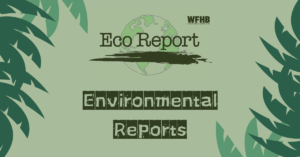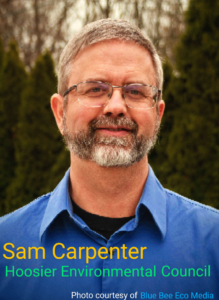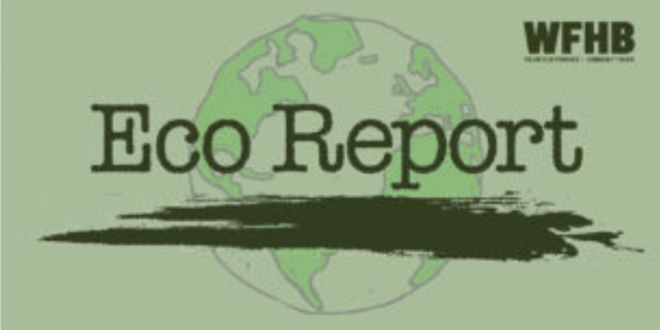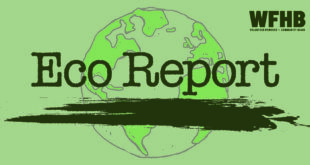Podcast: Play in new window | Download (Duration: 29:41 — 27.2MB)
Subscribe: RSS
Coming up in this edition of Eco Report, Agrivoltaics and Climate Resilience as Environmental Correspondent Zyro Roze brings us Part Three of his discussion with Sam Carpenter on bills opposed and backed by the Hoosier Environmental Council in the 2024 Legislative Session. The full four-part interview will be available online after the show as an E.R.X Eco Report EXTRA, to be found at WFHB.org.

This story appeared in the “Daily Journal” of Franklin. A controversial bill that would strip wetland protections in Indiana is the first to head to the governor’s desk after being fast-tracked by the Indiana General Assembly. House Bill 1383, authored by Rep. Alan Morrison, R-Versailles, clarifies various wetland definitions and eliminates certain wetland rule-making requirements. The bill would shift some Class III wetlands down to Class II, a class that already has few protections because of another state law passed in 2021. The Senate approved the bill 32-17 on Tuesday, less than a month after its first reading in the House. Some residents, environmentalists and state senators have expressed concerns that it was fast-tracked despite heavy opposition.
Environmental activists and some state legislators also questioned whether the bill would actually protect wetlands or dwindle them further. In 2021, Indiana passed another controversial bill that left nearly 80% of the state’s wetlands unprotected, with only 25% of wetlands being mitigated since then, according to the Hoosier Environmental Council, or HEC. A one-acre wetland can typically store over one million gallons of water, according to the Environmental Protection Agency.
This means nearly 400 million gallons of water storage has been removed without mitigation since 2021, according to data from the Indiana Department of Environmental Management. Indiana has also lost 85% of wetlands in the last 200 years, according to the Indiana Department of Natural Resources. Last year, the U.S. Supreme Court ruled unanimously against the EPA, leaving the fate of wetlands in the state’s hands, Sen. Rick Niemeyer, R-Lowell, said during the Senate vote on the bill Tuesday.
Indiana is already seeing accelerated wetland loss, said Indra Frank, environmental health and water policy director for the HEC. The continued stripping of wetland protections is “very discouraging,” she said. Sens. Greg Taylor, D-Indianapolis, and Shelli Yoder, D-Bloomington, questioned how involved environmental consultants and groups were in the legislation.
During the committee hearing on the bill, 26 people — including organizations involved in drafting the bill — testified in opposition to the bill. Only three testified in support. Builders, environmental activists and consultants, including the HEC, and IDEM staff helped draft the legislation last July, Niemeyer said. Representatives from the Indiana Builders Association told the Indiana Capital Chronicle the bill was a compromise to prevent permitting delays. Profit over people! Even though the bill passed, please contact the Governor today to voice opposition to this legislation.
Last week we aired a story about olive trees. Following is more information. In a Counterpunch article by Joshua Frank, it is noted that olive trees in Palestine, in addition to being a means of economic sustenance are a long standing cultural practice. The harvesting of olives on wild trees extends back thousands of years. The razing of such groves has had disastrous results including soil erosion, and climate change. Since 1967, more than 800,000 Palestinian olive trees have been illegally uprooted by the Israeli authority accordinging to a 1921 Al Jazerra report.
Besides providing a harvestable commodity for numerous bird species, including Jays, Finches and crows they rely on the biodiversity provided by Palestine’s wild trees. Multiple species of these trees are often found in native olive groves. Olive groves in Palestine, in addition to being cultural landscapes, are important globally as an agricultural system based on their biodiversity, cultural, and economic values. ”An ancient, native olive tree should be considered a testament to the very existence of Palestinians and their struggle for freedom. With its thick spiraling trunk, the olive tree stands as a cautionary tale to Israel, not because of the fruit it bears, but because of the stories its roots hold of a scarred landscape and a battered people that have been callously and relentlessly besieged for more than 75 years.”
There have been major developments in climate change. One is that the average temperature of the globe exceeded 1.5 C for 2023. This comes as no surprise. The second development is the oceans are warming at a faster pace than predictions. Thus, the glaciers are melting faster. Of particular concern are the glaciers on Greenland and Antarctica, simply because they contain the most water. It may be that previous projections of ocean rise are vastly underestimated. Most projections over the last three decades have pegged ocean rise between one and three feet by the years 2100. The new projections say the increase could be as much as sixteen feet, and much of that could come in large chunks. The biggest chunk could come from the release of the Thwaites Glacier from the Western Ice Sheet in Antarctica.
Thwaites Glacier is closely monitored for its potential to raise sea levels since the 1980s, Thwaites and Pine Island Glacier have been described as part of the “weak underbelly” of the West Antarctic Ice Sheet, in part because they seem vulnerable to irreversible retreat and collapse even under relatively little warming, yet also because if they go, the entire ice sheet is likely to eventually follow. This hypothesis is based on both theoretical studies of the stability of marine ice sheets and observations of large changes on these two glaciers. In recent years, the flow of both of these glaciers has accelerated, their surfaces have lowered, and their grounding lines have retreated. They are believed very likely to eventually collapse even without any further warming. The outsized danger Thwaites poses has led to some reporters nicknaming it the Doomsday Glacier, although this nickname is controversial among scientists.
The third development is that the fresh water melting on Greenland may cause the global circulation of sea water to stop. This hypothesis was first proposed twenty years ago. If that happens, a danger is that heat from the equatorial regions may not be transported to polar regions. Thus, the Gulf Stream, for example, may not transport heat to northern waters. Would Europe experience a new ice age? One thing is for sure, it would disrupt weather patterns worldwide.
NBC reports that as electric vehicle demand slows, workers caught in the middle face an uncertain future. Thousands of workers face layoffs or transfers as automakers scale back on their lofty EV ambitions. This year was shaping up to be a good one for the workers at the GM Orion Assembly plant in a working-class suburb of Detroit. After winning a pay raise following last year’s United Auto Workers strike, they were slated to start production later this year on a marquee product for GM: the electric Chevy Silverado pickup truck.
But like thousands of other workers on the front lines of the electric vehicle transition, they have hit some bumps in the road. GM told the nearly 1,000 workers at the Orion plant in December that they were being laid off until late 2025 to make engineering improvements and amid cooling demand for electric vehicles. Their last paycheck was their holiday pay the week of Christmas, and many are still waiting to find out if they will be offered a job at another plant. Electric vehicles account for about 4.5% of new vehicle sales in Indiana, far below national average.

And now, Part Three on the 2024 Legislative Session at the State Capitol with Zyro Roze and the HEC’s Sam Carpenter. The full four-part interview will be available online after the show as an E.R.X Eco Report EXTRA, to be found at WFHB.org.

- Learn how to identify trees in the winter during a Buds & Barks Winter Tree ID Hike at Olcott Park in Bloomington on Saturday, February 17th, from 2 to 4 pm. You will be outside taking a close look at the bark, branches and buds to seek out the tree identification. Dress for the weather.
- The Brown County State Park Winter Hike Series continues with a Ten O’Clock Line Nature Preserve Hike on Saturday, February 17th, from 10 am to Noon. This is a 2.5 mile, moderate hike along a fire trail and horse trail. The Ten O’Clock Line Nature Preserve is the largest nature preserve in the state and has a very unique story. Please dress for the weather.
- The Whooper Wednesdays will continue at Goose Pond Fish and Wildlife Area until February 21st. Come to the Visitors Center on Wednesday, February 21st, at 9 am to walk the property and see if you can spot some of the resident birds, including the endangered Whooping Crane. Make sure to dress for the weather.
- A Maple Syrup Made Easy Workshop is scheduled for Saturday, February 24th, from noon to 1:30 pm at the RCA Community Park in Bloomington. This hands-on workshop will discuss tree identification, equipment, collection and sugaring techniques. Register at bloomington.in.gov/parks.
- The Winter Hike Series at Brown County State Park continues with the CCC Ruins and Deserter’s Cave hike on Saturday, February 24th, from 11 am to 1 pm. This is a 1.5 mile round trip hike that will take you to the Civilian Conservation Corps area then you will hike to the Deserter’s Cave which is a very rugged section of off-trail hiking.
Credits:
This week’s headlines were written by Norm Holy and Cynthia Roberts.
Today’s news feature was produced Zyro Roze and edited by Kade Young.
Julianna Dailey assembled the script which was edited by the Eco Report team.
Julianna Dailey compiled our events calendar.
Kade Young and Noelle Herhusky-Schneider produced today’s show.
Branden Blewett is our engineer.
Anchors are Julianna Dailey and Frank Marshalek.
 WFHB Bloomington Community Radio
WFHB Bloomington Community Radio


